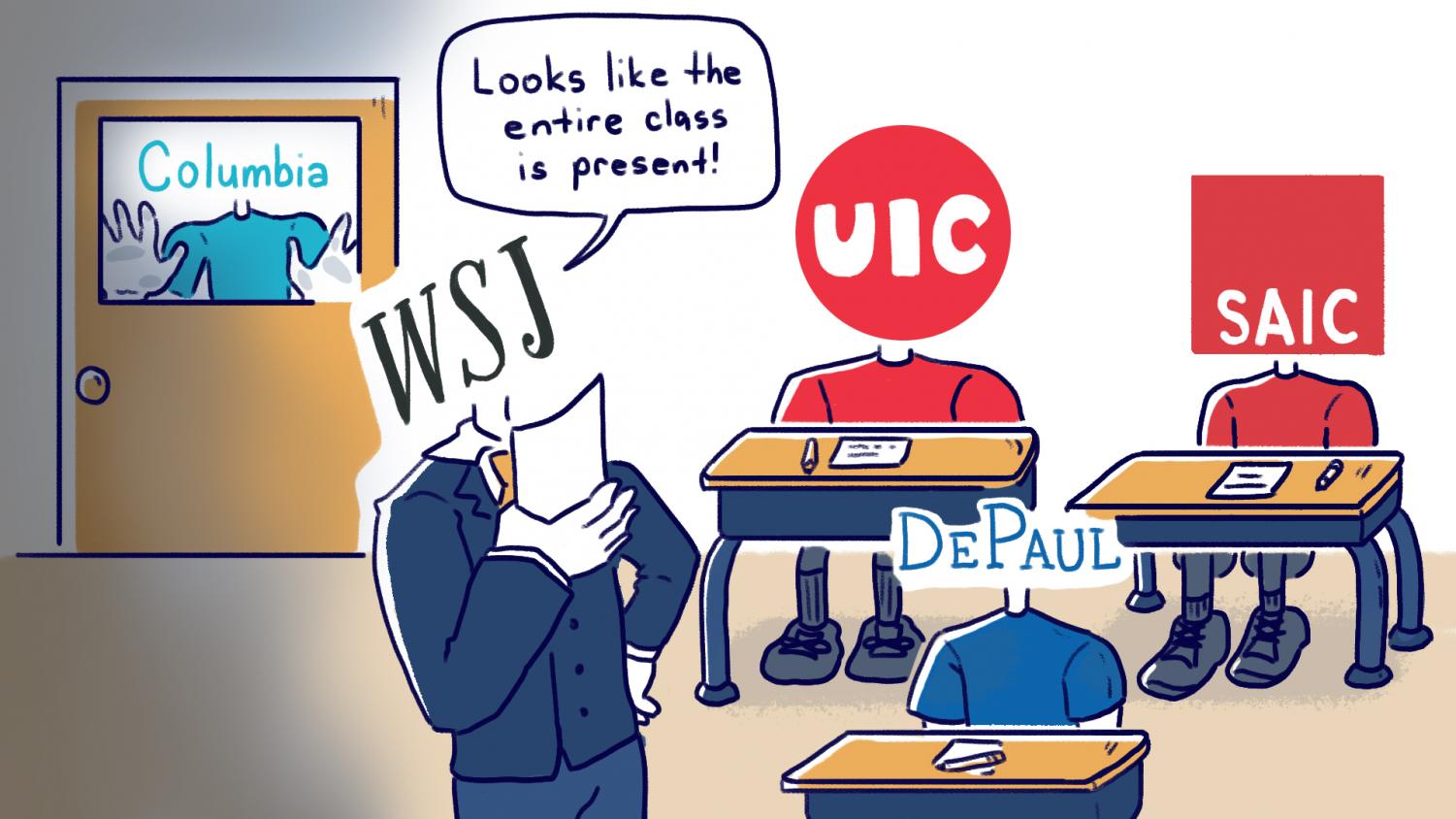Columbia falls short in national rankings—but students don’t mind
September 23, 2019

Columbia was not included on The Wall Street Journal/Times Higher Education 2020 College Rankings list, but these lists do not seem to matter to students.
For one, Columbia can point to its other rankings, which put more emphasis on its creative chops. Columbia’s film and comedy programs have received accolades in the past two months, landing spots on The Hollywood Reporter’s Top 25 American Film Schools list and College Magazine’s Top 10 Colleges for Aspiring Comedians list.
Interviews with the Columbia student body, high school students, potential transfers and academic counselors revealed that rankings such as The Wall Street Journal’s, released earlier this month, are only one consideration— if at all —when choosing a college.
Still, in The Wall Street Journal/Times Higher Education ranking, Columbia did not make the Top 500, despite 27 other Illinois schools making the cut, including some Chicagoland colleges such as the School of the Art Institute of Chicago, DePaul University and the University of Illinois at Chicago.
The Wall Street Journal/Times Higher Education’s methodology for the rankings primarily explores four key pillars, according to THE’s website: resources, or how much capacity a college has to effectively educate its students; engagement, or how effectively colleges engage students; outcomes, which includes graduation rates and post-graduation salaries; and environment, which examines the diversity of the student and faculty populations at a college.
While Columbia scored higher than some other Illinois schools within the top 500 on all pillars other than outcomes, its overall ranking fell somewhere above the 600 mark, though where it specifically ranked is unclear as schools were lumped together by the hundreds past the 400th ranking.
The outcomes pillar, which is weighed as 40% of the overall ranking, looks at graduation rates, the value added to a student’s salary earning potential by their education, debt after graduation and academic reputation, which is based on an annual Academic Reputation Survey of leading scholars.
“The college has decided to be more proactive when it comes to college rankings,” said Chief of Staff Laurent Pernot in a Sept. 12 email to the Chronicle. “While we are paying closer attention to rankings than we did in the past, we continue to think such rankings play only a small role in any strategy to increase enrollment. We believe our renewed emphasis on personal interaction with potential students, our revamped financial aid strategy and our stepped-up marketing efforts are what is moving our enrollment upward, combined with the tireless work of faculty and staff to sustain the quality of our academic offerings and to serve as everyday advocates for Columbia.”
Many students do not factor college rankings into their higher education enrollment decisions.
Emily Biggs, a senior at Jones College Prep, 700 S. State St., said she does not care about rankings. However, she does know students so concerned about prestige that they are only applying to Ivy League institutions.
“The most important thing for me is the academics and how I would succeed there, instead of how the nation perceives it as a school,” Biggs said.
Keith Maurice Harris, a freshman at Harper College—a two-year college in the northwest suburb of Palatine—is looking to transfer to a four-year school, but he is also unconcerned with rankings. Instead, he prefers to look at firsthand forum reviews of schools because he does not trust rankings to always be accurate.
According to John Baima, a college counselor at Fremd High School in Palatine, higher achieving students are typically more aware of college rankings. However, Baima thinks a high ranking is less relevant than the fit for an individual student.
“I’m more concerned about the fit outside of the major,” he said. “I want students to be happy and secure where they’re at because that usually equals success.”
Baima has also seen a shift in why students care about these rankings in the 20 years he has worked as a counselor, as it has changed from parent-child pressure to peer-motivated pressure.
“Everything is posted now on social media. When they get into certain places, everyone knows,” Baima said. “So, I think it has to do with prestige; it has to do with how they’re viewed.”
Prestige did not matter to freshman audio design and production major Marcus Gualandri, who did not look at college ranking lists when applying to schools.
“What matters is the community and environment you’re in,” he said. “As long as you know the school [offers] a good education while sustaining good relationships and building connections, that’s what matters.”







